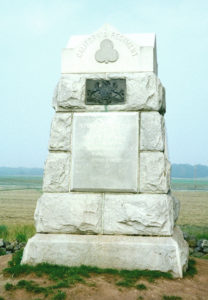Bob Burch on “California in the Civil War: Other California Units”
 This is the fifth of a twelve-part series on California and the American Civil War. This presentation will explore the history of those units that served in the Eastern Theater during the American Civil War that enlisted a good portion of their recruits from California or had that state’s name in their unit designation. Nearly ten percent of Californians who volunteered during the war did so into units from other states. They did so for a variety of reasons including the desire to represent their state during the war to preserve the Union. Consequently these “other California units” represented their state continuously from the Battle of First Bull Run until General Lee’s surrender at Appomattox four years later.
This is the fifth of a twelve-part series on California and the American Civil War. This presentation will explore the history of those units that served in the Eastern Theater during the American Civil War that enlisted a good portion of their recruits from California or had that state’s name in their unit designation. Nearly ten percent of Californians who volunteered during the war did so into units from other states. They did so for a variety of reasons including the desire to represent their state during the war to preserve the Union. Consequently these “other California units” represented their state continuously from the Battle of First Bull Run until General Lee’s surrender at Appomattox four years later.
Eventually Californians served in five other states’ volunteer regiments. On the West Coast these units were the 1st Washington Territory Infantry and 1st Oregon Cavalry Regiments. On the East Coast these were the 32nd New York Infantry Regiment (aka “California Regiment”), Baker’s Brigade (aka “California Brigade”) of four regiments, and the 2nd Massachusetts Cavalry Regiment’s “California Hundred” and “California Battalion”.
Along the way we will meet several forgotten Californians who served their country well. Colonel Roderick Matheson from Healdsburg who fought at First Bull Run and later died from wounds received at the Battle of Crampton’s Gap. Colonel Francis Pinto of San Francisco who commanded regiments during the Peninsula, 2nd Manassas, Fredericksburg and Chancellorsville Campaigns. Major Archibald McKendry who commanded the California Battalion and eventually the 2nd Massachusetts Cavalry Regiment when only a captain. Captain James Sewell Reed of the California Hundred who died while leading his unit against Mosby’s partisans and Captain Hugh Armstrong who replaced him and led that company from Battle of Fort Stevens until Appomattox. And Captain Henry Crocker of San Francisco who participated in nine battle and was awarded the Congressional Medal of Honor for valor at the Battle of Cedar Creek.
Except for the “CAL 100” Cavalry, these units have disappeared from history despite the presence of the California Regiment’s monument on Cemetery Ridge at Gettysburg and mention in many original source documents from newspapers to the Official Records. This presentation will attempt to remember and honor their contribution to the Union cause.
Bob Burch is a native Californian, born and raised in Santa Clara County. He is also a lifetime student of the Civil War. He had the opportunity to visit many Civil War sites from Florida to Pennsylvania to New Mexico during his 30 year military career. Like many California CWRT members, he desires to understand his home state’s role in the war. He started collecting material for this presentation ten years ago and initiated a serious study 15 months ago. This series documents his research in great detail. Time allows only a few key points from each slide to be presented. Numerous period photographs and magazine drawings are included for visual effect with the intent of comprehending California’s role in the Civil War.
Meeting Minutes June 2017


